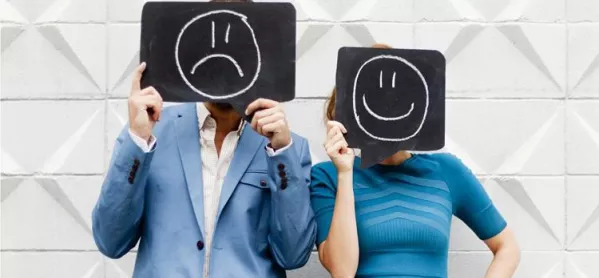For me, teaching and anxiety went hand in hand for years. In fact, the anxiety seemed to manifest itself as the incessant voice of self-doubt in the back of my mind. It convinced me that I was a failure and that anyone who said otherwise was lying. It didn’t matter how many times I was told that I was an outstanding teacher; the anxiety wouldn’t let me believe it. Until, one day, I couldn’t function anymore.
I started to suffer daily panic attacks. They became so bad that there were hours each day when I couldn’t walk, or talk. I suffered from paralysis brought on by fear. I couldn’t leave the house. I didn’t want to talk to my friends or family. I cut myself off from the world. But, thankfully, I wasn’t ready to give up; I held on to a shred of hope that things might get better.
So I started to talk. That’s when I began to understand that I was ill and that I wasn’t a failure, or a burden, and that the world wouldn’t be a better place without me in it. My school was incredibly supportive. They advised me to take time off, so I did. Reluctantly. At first I thought that I might be signed off for a few weeks, then maybe a term. But, ultimately, the guilt I felt as a result of not being in school meant that I had no choice but to resign. I was devastated.
But it gave me the opportunity to seek professional help. I started seeing a psychotherapist who helped me see the anxiety as something separate from me; I wasn’t defined by the illness. That was a huge turning point. I also started taking medication. Dealing with anxiety, or any mental illness for that matter, can be a bit like walking a tightrope: precarious, terrifying, lonely. For me, the medication acted as a temporary safety net in case I fell. I know medication isn’t right for everyone but, in my case, it made a significant difference.
Alongside the therapy and medication, I also learnt a few basic methods that I continue to use to help manage my anxiety on a day-to-day basis. One of the most effective methods is mindfulness. It might sound trivial, but I spent so many years functioning on autopilot that I didn’t know how I really felt. I was on the precipice for a very long time, clinging on for dear life, with no awareness or understanding of the panic I felt. Slowing down and allowing myself time to breathe has made a huge difference. It’s the first time I’ve felt a real sense of calm in my whole adult life.
I’ve also learned not to trust all of my thoughts. Again, I never gave myself the freedom to question them even when they became catastrophic. I was so consumed by a self-destructive, anxiety-fuelled narrative, that I just accepted what I thought was true. Now, when I start to feel anxious, I write down what I know to be fact and try to separate that from what the anxiety is trying to convince me is true. I found this really challenging at first but, after a while, it starts to become second nature; it’s a bit like re-educating your brain after a lifetime of bad habits.
However, the most effective coping mechanism I have at my disposal is to be honest with myself about how I’m feeling. Not to keep going when I feel like everything around me is falling apart. I’ve learned to accept that my feelings matter too; that I matter. I spent 10 years in education trying to keep everyone else happy and to be the best teacher that I could be. But I sacrificed myself in the process. I often look back and think about how different the outcome might have been if I had just slowed down, or spoken to someone about how I was feeling, or taken the time to breathe. But I learned the hard way. We should never have to sacrifice our health or ourselves to be the best at what we do. Nothing is worth that.
Madeleine Hyland was a teacher for 10 years and a head of English for three before she left the classroom
